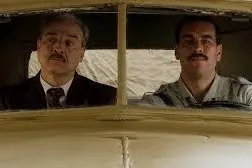Dinner: And for dessert, Francisco Franco Bahamonde (***)

Before Chaplin shot The Great Dictator, the Marx Brothers (with invaluable help from the great Leo McCarey) completed Duck Soup. Both cases are extreme and very funny examples of how, sometimes, comedy is the most appropriate way to describe the greatest of dramas. It was Bergson, one of the few to take comedy seriously, who maintained that laughter suspends emotion. There is no greater enemy of laughter than emotion. Laughter helps us think from a distance, from above. And Edgar Neville, much more radical, raised the stakes to make it clear that laughter is the language with which intelligent men address their equals. And that, precisely, is the power of laughter: its ability to distance itself, even at wakes. Especially there. Indeed, genocidal dictators, in their mortuary endeavors, can make us die of laughter. What things.
Manuel Gómez Pereira's Dinner is essentially a funny comedy about a bizarre and very tragic event: the organization of a more or less opulent banquet in the midst of the greatest famine. Based on Alonso de Santos' work , Dinner of the Generals, the director returns to the key elements of the cinema that brought him such success in the 1990s (think of Mouth to Mouth or Love Seriously Damages Your Health ) , elegantly and tastefully blending confusion and misunderstanding, perplexity and doors that open and close. The novelty this time is the plot, the sad plot. That, and the fact that, in the background, sipping his soup, appears a man who eats little and kills a lot, a character as comical in attitude, voice, and presence as he is lacking in grace.
Shortly after the end of the Civil War, the dictator demands a corresponding celebration at a devastated Palace Hotel. A young lieutenant played by Mario Casas, a punctilious and experienced maitre d' masterfully embodied by Alberto San Juan, and a group of Red chefs, as well as prisoners of war and cannon fodder, prepare to make the impossible possible. What follows is, as it could not be otherwise, nonsense. And it is so in the broadest, most bitter, and most bitterly and joyously funny sense.
The director lets the script, duly supported by inspired performances (neither as eccentric as the plot calls for nor as serious as the situation demands), set the pace. He wants it to be a comedy meant to be listened to, so that the individual dramas of each member of the essentially ensemble cast are portrayed on screen with the affection and even respect they deserve. And so, the film moves forward in a precise, delirious, and even slightly painful manner due to the irresistible irreverence of the laughter in the middle of the wakes. It's true that the excess of modesty, or reverence, detracts from the effectiveness of some of the moments that perhaps would have required much more blood, more clarity, even more cruelty. But perhaps the time isn't right for that. And for dessert, of course, Francisco Franco Bahamonde. Let's see who can stomach it.
—
Director : Manuel Gómez Pereira. Starring : Mario Casas, Alberto San Juan, Asier Etxeandia. Running time : 106 minutes. Nationality : Spain.
elmundo





